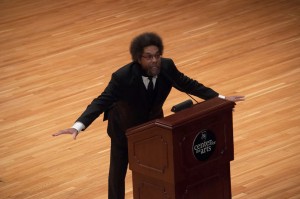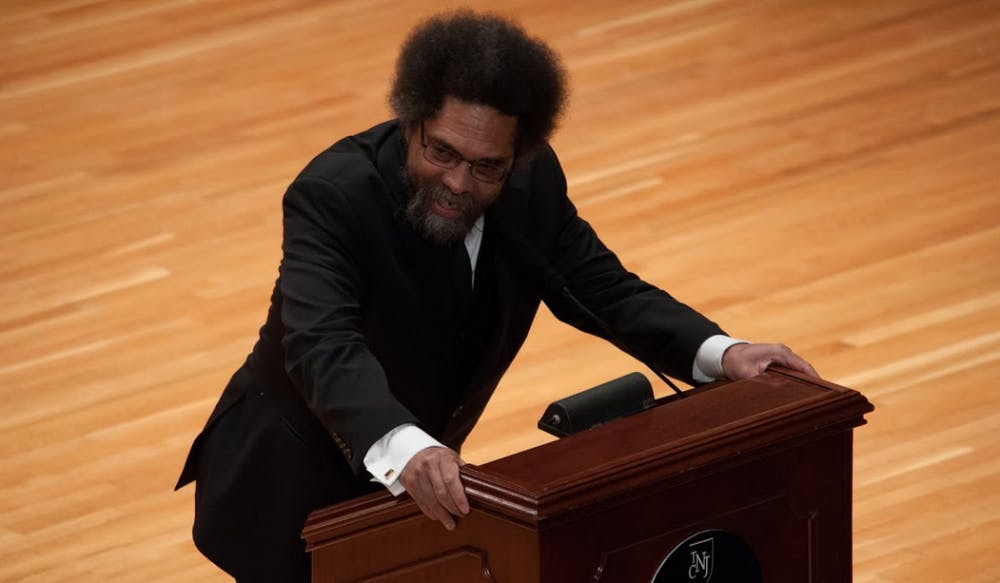On July 2, 1964, the Civil Rights Act of 1964 was signed into law by President Lyndon B. Johnson. It was a watershed piece of legislation, ending de jure segregation and discriminatory policies from the workplace to the voting booth. It also began to mend America’s social inequality that had persisted — and in many ways continues to do so — for so long.
On this year marking the bill’s 50th anniversary, the struggle against that inequality has not been diminished. But it’s no longer solely defined by images of the Black Freedom Movement marching on Birmingham and Washington. To Cornel West, professor of philosophy and Christian practice at Union Theological Seminary and professor emeritus at Princeton University, the movement is universal.
“The black freedom movement has never been a movement solely about black people,” West said. “It’s about raising these questions about what it means to be human — questions of truth and questions of love, knowing, of course, that justice is what love looks like in public.”

West knows this best. As one of the premier public intellectuals of this era, his work has closely dissected race relations in American democracy as they’ve evolved over the course of half a century. Through lenses of race, gender, culture and what he defines as the politics of “non-Marxist socialism,” West is a breathing textbook, all at once espousing economic theories and allusions to the Wu-Tang Clan. Speaking to the College on Thursday, Feb. 20, he discussed the lessons of civil rights activism with much of the same panache, equal parts preacher and profound cultural scholar.
Those lessons learned from the Black Freedom Movement are better described as values. According to West, no intellectual stated them better than historical black activist W.E.B. DuBois.
“DuBois put it best when he wrote, ‘How shall integrity face oppression? What shall honesty do in the face of deception, decency in the face of insult,’ and ‘what shall virtue do to meet brute force?’” West said.
These questions of value have racked the minds of leaders and thinkers alike, phrased as seemingly answerless appeals with contradictions aplenty. But their significance cannot be understated.
“When I started with that quote from DuBois — integrity, honesty, decency and virtue — they must never be reduced to market value,” West said in an interview with The Signal. “Once they’ve been reduced, civilization becomes a spiritually vacuous culture. Everything becomes empty.”
The Black Freedom movement carried these values not as burdens, but as torches. The greatest members of their community, from Martin Luther King Jr. to Nelson Mandela, cannot be called great men on the basis that they were willing to forgive “while sitting in that jail,” according to West. To claim all activism is forgiveness would be a mischaracterization. Rather, it was the magnitude of their love that “spilt over” and raised them up to a calling, a cause, with voices that were distinct among many.
“(The Black National Anthem) doesn’t say lift every echo, but lift every voice,” West said. “You’ll never be able to lift your voice if you don’t straighten up your back and ask questions about yourself and society.”
To think critically is just as necessary as love. Blacks didn’t respond to white oppression by forming a “black Al Qaeda,” West said, but answered instead with a unifying hand. Members of the movement did not “gangsterize” a country that had extorted them first. Nor did they squabble to become celebrities of their cause. The movement was grounded in a profound discourse, and the suffering of others was the suffering of the movement.
“We must not believe in blind faith,” West said. “God gave us a mind and we have to think, challenge ourselves, challenge institutions. Once it’s locked into ultimate authority ... then civilization is blacked out.”
In a time of economic and cultural unsettlement, the values adopted during the Black Freedom Movement are likewise the armaments for battling the future — of sacrificing, analyzing and downright loving. America grinds on the heels of troubling times. From Trayvon Martin’s shooting to the Supreme Court’s blow to equal voting rights, the struggle is clear and present. But West has seen it all. He asks that we interact with the world in ways that “touch somebody” to think critically, precisely what he does for every brother he meets, black, white and everything in between.







